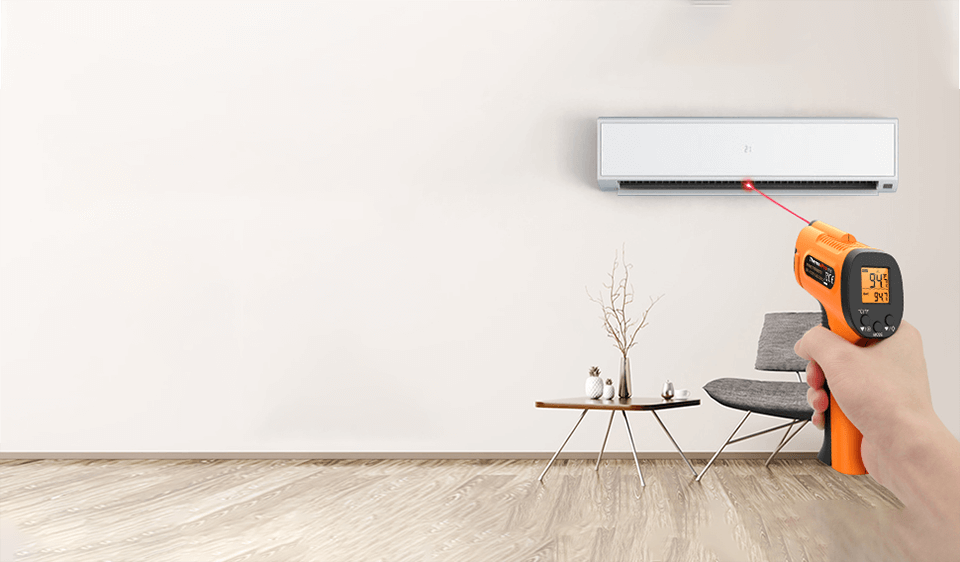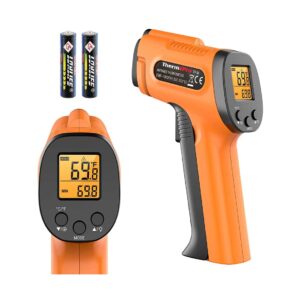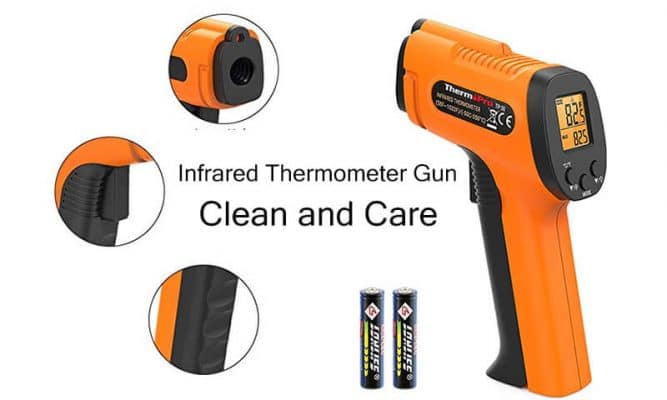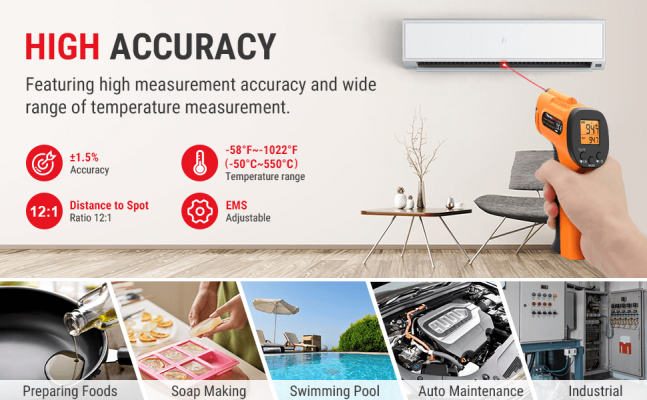The customer service team is always listening, taking notes, and quantifying complaints to ensure our products are continually improved. Due to selling directly to you, the customer, via Amazon, we can use product reviews to help us improve our existing products or help further development of new products.
Common Misconceptions about Infrared Thermometer Gun
Table of Contents
Although infrared thermometer gun is widely used, there are several misconceptions about infrared thermometer guns that you should be aware of before using your own. Understanding this type of tool and the ways to use it properly will help you get the most out of it and ensures a more accurate temperature measurement.
In this article, we have cleared up some of these misconceptions and gone into detail about a thermometer gun feature called fixed emissivity, a topic that confuses a lot of first-time infrared thermometer gun users and sometimes makes the product more difficult to use.
What’s more, we discuss how the ThermoPro TP30 Digital Infrared Thermometer Gun helps users get accurate temperature readings on just about any material by doing away with the issue of fixed emissivity. Keep reading to learn more!
What is an Infrared Thermometer Gun?
Before diving into the misconceptions surrounding this tool, you should first fully understand what an infrared thermometer gun is in the first place.
An infrared thermometer gun can measure temperatures of an object from a distance and with no contact necessary. It does this using infrared technology, inferring the temperature simply from the thermal radiation and infrared energy that an object’s surface is giving off.
There are many situations in which an infrared thermometer gun is more convenient and safe to use than a standard thermometer which requires contact. Most notably, these thermometer guns are used to measure the temperature of electrical equipment or mechanical equipment and to detect hidden hot-spots behind surfaces. There is really no end to their uses and benefits, however.
Common Misconceptions About Infrared Thermometer Guns
1. The LASER Reads the Temperature
Infrared thermometer guns are often referred to as laser thermometers. This makes sense because many feature a laser that shoots out of the front of the gun both before and during temperature measurements.
The laser is not what actually reads the temperature, though. It is easy to think that this would be the case because the laser is the only part of an infrared thermometer that actually comes into contact with the surface of the object being measured. Remember, though, that no contact at all is required to measure temperature with infrared technology.
Instead, the laser simply functions to help the user of the thermometer gun aim it at a more precise location. You want to be careful when you are using this type of thermometer that you are aiming at a very specific surface to avoid interference from nearby objects. Seeing the end of the laser make contact with the surface sill help you understand precisely where the gun is aimed.

2. An Infrared Thermometer Will Tell You the Internal Temperature
Because these types of thermometers use infrared technology to read an object’s thermal radiation, they cannot tell you what the internal temperature is. The thermometer is unable to penetrate the surface of an object, so it is also unable to detect any temperature going on behind that surface.
Instead, an infrared thermometer gun gives you a temperature reading of the energy coming off of the surface of the object itself. This is incredibly helpful when searching for hot-spots or working with electrical and mechanical equipment which can externally heat up and become unsafe or ineffective.
3. Every Surface Is Equally Created
When dealing with infrared energy, all surfaces are definitely not created equally. Different types of materials have different levels of something called emissivity, which is that material’s actual ability to emit infrared energy.
Emissivity is measured on a scale of 0.00 to 1.00. Generally speaking, the closer to an emissivity of 1.00 a certain material has, the more infrared energy is emitted and the easier it is to get an accurate temperature reading using an infrared thermometer gun. Any object composed of materials with an emissivity closer to 0.00 will be more difficult to measure accurately.
This is important to remember when working with certain types of materials and will help you keep your temperature measurements as accurate as possible.
What is Fixed Emissivity?
Now that we have done away with some of the top misconceptions about infrared thermometers, we can go into detail about fixed emissivity. This is an important concept to understand, especially when dealing with the misconception that all surfaces are created equally when it comes to the use on an infrared thermometer gun.
Fixed emissivity is a feature that you can find on certain infrared thermometer guns. With this feature, the gun’s emissivity is set to only be able to read emitted thermal energy that reads on the higher end of the emissivity scale, typically from about 0.95 – 0.97. This is fine if you are only using the thermometer on materials in this range, but it extremely limits your ability to use the thermometer on a wide variety of materials and objects accurately.
Alternatively, some higher quality infrared thermometer guns, like the ThermoPro TP30 Digital Infrared Thermometer Gun, have a feature that allows the user to adjust the emissivity depending on the material it is being used to measure. With the ThermoPro TP30, for example, you can set the emissivity anywhere from 0.1 – 1.00 and get an accurate temperature reading on just about any surface material.
We hope this article cleared up any misconceptions you had about infrared thermometer guns so that you can begin using yours as simply and as accurately as possible. We highly recommend purchasing and using the ThermoPro TP30 Digital Infrared Thermometer Gun if you are looking for an extremely accurate option that does away with the hassle of fixed emissivity altogether.
-
ThermoPro TP30 Infrared Thermometer Gun, Laser Thermometer for Cooking
$29.99Original price was: $29.99.$19.99Current price is: $19.99. $19.99Rated 4.85 out of 5Add to cart










